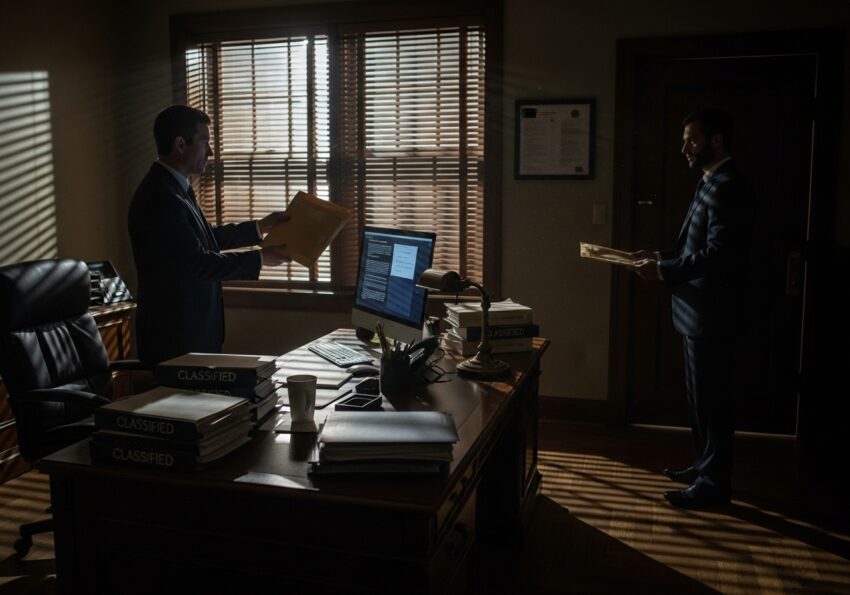The curtain has finally lifted—just enough—for us to glimpse what many in Washington already suspected but few dared say aloud: Adam Schiff, the Democrats’ once-glorified maestro of the Trump-Russia hoax, was allegedly orchestrating far more than press conferences and cable news hits. According to newly declassified FBI documents, Schiff didn’t just push the collusion narrative—he allegedly directed the leaking of classified information to damage President Trump and manipulate public opinion. Now, with whistleblower testimony in hand and FBI memos declassified by Director Kash Patel, the story behind the story is beginning to emerge.
The whistleblower, a former Democratic staffer on the House Intelligence Committee, told the FBI that Schiff explicitly advocated for leaking classified material derogatory to Trump following the 2016 election. Not for oversight. Not for national security. For politics. According to the FBI summary, Schiff stated in a meeting that the goal was to use the leaked information to “indict President Trump.” When concerns were raised about the legality of such actions, Schiff’s associates reportedly reassured those in the room that they wouldn’t get caught. In D.C., where deniability is currency, that’s the equivalent of a green light.
Let’s be clear: this isn’t about whether Schiff believed Trump colluded with Russia. This is about how he allegedly chose to prosecute that belief—not through the legitimate mechanisms of government oversight, but through covert manipulation of classified material and media narratives. Schiff, long suspected of being the Democrats’ go-to leaker, appears to have treated the House Intelligence Committee like a political war room. The whistleblower’s testimony paints a picture of a man not just obsessed with undermining Trump, but also bitterly disappointed that his own political ambitions—reportedly including a dream of becoming CIA director under a Hillary Clinton administration—had gone up in smoke.
In that context, the leaks weren’t just political tactics—they were personal vendettas wrapped in national security drag. Schiff’s cloak-and-dagger operation appears to have operated under the assumption that the ends justified the means, with leaks framed as a patriotic duty to correct what he saw as a constitutional crisis. But the real crisis was internal: a party in denial, desperate to delegitimize the incoming administration by any means necessary.
And Schiff wasn’t acting alone. The whistleblower also mentioned Rep. Eric Swalwell—a man whose own entanglements with foreign intelligence have raised eyebrows—as a suspected conduit for the leaks. Swalwell, already warned for his reputation as a leaker, was allegedly involved in disseminating classified material that mysteriously showed up in the press within 24 hours of closed-door committee reviews. The whole thing reads less like a responsible intelligence operation and more like a Beltway version of House of Cards.
Schiff’s defenders will no doubt hide behind the Constitution’s speech and debate clause, claiming legislative immunity for their actions. But leaking classified information isn’t protected speech—it’s a violation of the oath these lawmakers swore. Schiff gambled that his position on the Intelligence Committee would shield him from scrutiny, and for years, it did. The media, ever eager to amplify any scrap of anti-Trump narrative, played its role on cue.
But that protection may be evaporating. With Patel now at the helm of the FBI and a Republican-controlled Congress, the institutional shields that once protected Schiff are beginning to crack. Patel has handed these memos over to Congress, and the implications are already rippling through the intelligence community. If lawmakers used their positions to weaponize classified information for political purposes, that’s not just an ethical failure—it’s a fundamental corruption of the national security apparatus.
This isn’t just about settling old scores. It’s about dismantling the architecture of political espionage that was quietly built into the fabric of congressional oversight during the Trump years. If Schiff and his allies turned the House Intelligence Committee into a partisan leak machine, then the real scandal isn’t what they accused Trump of doing—it’s what they did to stop him.
In Washington, power is rarely seized in daylight. It’s taken in quiet meetings, through whispered promises, and, sometimes, through leaks passed in plain manila envelopes. Schiff, once the darling of the Resistance, now faces the possibility that his greatest legacy won’t be a Trump indictment—but his own entanglement in a conspiracy of his own making.
Click this link for the original source of this article.
Author: rachel
This content is courtesy of, and owned and copyrighted by, https://www.nationalinsiders.com and its author. This content is made available by use of the public RSS feed offered by the host site and is used for educational purposes only. If you are the author or represent the host site and would like this content removed now and in the future, please contact USSANews.com using the email address in the Contact page found in the website menu.








